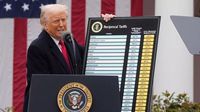As global tariffs and stock market turbulence continue to shake financial foundations, many Americans are left grappling with uncertainties regarding their personal finances. From pensions to mortgages, questions abound about how these economic shifts will impact everyday life. The BBC's Cost of Living Correspondent, Colletta Smith, has been addressing these concerns, providing clarity amidst the chaos.
One common question comes from Christine Bailey, a 68-year-old from Bolton, who expressed confusion about the term "tariffs." She noted, "I don't understand what is going on. What do tariffs mean?" To clarify, tariffs are essentially taxes imposed on imported goods from other countries. President Donald Trump has advocated for these tariffs as a means to encourage Americans to purchase more domestically produced products by making foreign items more expensive.
However, the implications of these tariffs are complex. Concerns have been raised about potential job losses, particularly in sectors like car manufacturing and machinery. As the cost of goods in stores may rise, the government could face challenges in meeting its economic objectives.
For individuals with private pensions, the current climate raises questions about potential losses. Smith advises that for those far from retirement age, there is no need for panic as pensions are long-term investments. "If you're getting close to retiring, your pension pot is likely to be moved to less risky investments, such as government bonds," she explained. This strategy is particularly relevant now, as stock market fluctuations could mean lower returns for those relying on invested pensions.
Brian Waldie, a 64-year-old investor, shared his own experience with the recent market volatility. He reported a loss of £1,500 in just three days from a Child Trust Fund he has been contributing to since 2007. "We were trying to make our daughter's life simple but this is money I can't afford to lose," Waldie lamented.
In terms of tariffs, the UK government has indicated a cautious approach, stating that it will not rush into imposing tariffs on imports. While products from the USA may become pricier, those from countries already facing tariffs might become cheaper in the UK market, creating a complex web of pricing dynamics.
The situation also raises questions about mortgages. With many consumers expressing anxiety over rising interest rates, Chris from Sussex inquired whether the ongoing uncertainty might lead to lower mortgage rates. The Bank of England is concerned about a growing nervousness among businesses and consumers, prompting predictions of potential interest rate cuts. Initially expecting two cuts this year, analysts are now forecasting a third cut, which is already being factored into mortgage pricing.
As President Trump continues to escalate the tariff wars, the landscape is shifting rapidly. On April 2, 2025, he announced a sweeping new round of tariffs, dubbing it "Liberation Day." This included a baseline tax of 10% on nearly all of America’s trading partners, with steeper rates for countries with trade surpluses with the U.S. These tariffs took effect on April 5, 2025, and have raised concerns about rising consumer prices.
Among the new tariffs, imports from Lesotho face an astonishing 50% levy, while countries like Madagascar, Vietnam, Taiwan, South Korea, Japan, and the European Union are also subject to significant taxes. Notably, Trump recently announced a 34% tariff on China, which, when combined with earlier tariffs, brings the total to a staggering 104%.
In retaliation, China has announced its own 34% tariff on U.S. goods, set to take effect on April 10, 2025. This tit-for-tat strategy underscores the escalating tensions and uncertainty in international trade relations.
The ramifications of these tariffs extend beyond consumer goods. A sharp sell-off in U.S. government bond markets has raised alarms among investors, with yields on 10-year Treasuries rising to 4.45% on April 9, 2025, a notable increase from just below 4% days earlier. Yields on 30-year bonds also surged, topping 5% at one point.
As the stock market faces increasing volatility, the S&P 500 is nearing bear market territory, having dropped 20% from its recent high. This market instability has prompted questions about the traditional safe-haven status of U.S. Treasuries. Priya Misra, a portfolio manager at JPMorgan Asset Management, noted, "The global safe-haven status is in question. Disorderly moves have happened this week because there is no safe place to hide."
Despite these concerns, U.S. Treasury Secretary Scott Bessent attempted to downplay the sell-off, suggesting it is merely a normal deleveraging process in the bond market. However, the significant market movements have raised broader concerns about how foreign investors perceive the U.S. in light of the aggressive tariff policies.
Former U.S. Treasury Secretary Lawrence H. Summers echoed these sentiments, warning that the sell-off indicates a "generalized aversion to U.S. assets in global financial markets," raising the specter of a potential financial crisis driven by government tariff policies.
As the landscape continues to evolve, both consumers and investors are left navigating a complex web of economic uncertainty. With tariffs impacting everything from pensions to mortgages, the need for financial planning and adaptability has never been more critical. As the situation unfolds, individuals are encouraged to stay informed and consider proactive measures to safeguard their financial futures.






